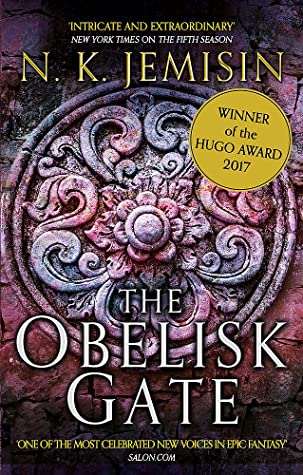SNQ: N.K. Jemisin’s “The Obelisk Gate”
by Miles Raymer

Summary:
N.K. Jemisin’s The Obelisk Gate is the middle book in her Broken Earth trilogy. Jemisin invites us deeper into the Stillness, continuing the story of Essun and some familiar supporting characters from the first novel (see my review of The Fifth Season for an overview). In The Obelisk Gate, we learn more about the history of the Stillness, including the mythology of how humans originally angered Father Earth, setting off a complex conflict spanning multiple millennia. We also learn more about Essun and her family’s unique role in this world, including their potential to put an end to the cycle of Fifth Seasons that has made human life so difficult for generations.
Key Concepts and Notes:
- I didn’t find this book quite as engaging as The Fifth Season, but I still enjoyed it. The “bridge book” in any trilogy is usually the place where the story risks becoming unfocused or dull, but Jemisin generally keeps things interesting and sets us up nicely for the story’s conclusion.
- Jemisin’s worldbuilding continues to impress me––the best quality of the series in my opinion. Her geology-based magic system is just really cool, and I like the feeling of the characters struggling to grok the scope of an epic historical battle into which they have been unwillingly dragged.
- The characterization also continues to be a highlight of the series. I did get a bit sick of Essun in this book (she spends a lot of time being tired and whiny), but the introduction of a few new perspectives brought in some new energy. I especially appreciated getting an inside look at one of the ostensible villains, which felt like a welcome injection of ethical complexity into the series.
- The theme of orogeny/magic as a balancing act between self-control and emotional reactivity remains strong, and I can see how Jemisin may continue to draw this out as she brings the story to a climax.
- Something that nagged at me while reading this book was the conspicuous absence of healthy, trusting relationships. Most of the personal relationships in the series are shot through with some combination of suspicion, manipulation, abuse, and sometimes violence––even the ones that also include genuine affection and mutual respect. This helps with maintaining narrative tension, to be sure, but as a reader who longs to be inspired by loving and cooperative connections between characters, I hope to see Jemisin exploring more positive interpersonal territory in the third book.
- Unfortunately, Jemisin seems to be going full in on the idea that everything was fine until humans pissed off Father Earth by being too greedy. The central plot of the series seems to revolve around atoning for this “original sin” and restoring a kind of “sacred balance” between humanity and nature. It’s hard to blame Jemisin given the popularity of this theme in modern culture, but I just don’t like it. It’s boring and lazy, especially when compared to other elements of the story that are much more creative.
- A related issue is that I harbor some misgivings about the story’s ethical undertones. In one sense this is positive because it’s making me think carefully and analyze my reactions. But I’m also feeling an aversion to some of Jemisin’s attitudes about fairness and social justice, especially regarding justifications for coercion and violence. For example, one of the climactic moments of this book involves a protagonist unilaterally canceling a voting process and forcibly taking over a community in order to ensure that their interpretation of what’s “right” prevails. They then enforce the community’s cooperation through magical dominance in a way that’s quite autocratic and anti-democratic. Shortly thereafter, this same character discovers how to take control of other people against their will, and uses their collective power to wipe out an entire city of people that is threatening their community. It’s a classic “ends justify the means” mentality, one with which I’ve always been uncomfortable. But, to be fair, it’s not clear to me whether Jemisin is tacitly endorsing these ideas or simply playing around with them.
- On the whole, I’m keeping all my critiques preliminary until I finish the series. Everything I’ve disliked so far is fixable, depending on how it all ends. Either way it’ll be a fun ride!
Favorite Quotes:
There is such a thing as too much loss. Too much has been taken from you both––taken and taken and taken, until there’s nothing left but hope, and you’ve given that up because it hurts too much. Until you would rather die, or kill, or avoid attachments altogether, than lose one more thing. (105)
You obeyed, once, because you thought it would make you safe. He showed you again and again, unrelentingly, he would not let you pretend otherwise––that if obedience did not make one safe…then what was the point? The game was too rigged to bother playing.
You pretended to hate him because you were a coward. But you eventually loved him, and he is part of you now, because you have since grown brave. (159-60)
In love, then, we shall seek understanding. (181)
You see it suddenly: the network. A web of silver threads interlacing the land, permeating rock and even the magma just underneath, strung like jewels between forests and fossilized corals and pools of oil. Carried through the air on the webs of leaping spiderlings. Threads in the clouds, though thin, strung between microscopic living things in water droplets. Threads as high as your perception can reach, brushing against the very stars. (361)